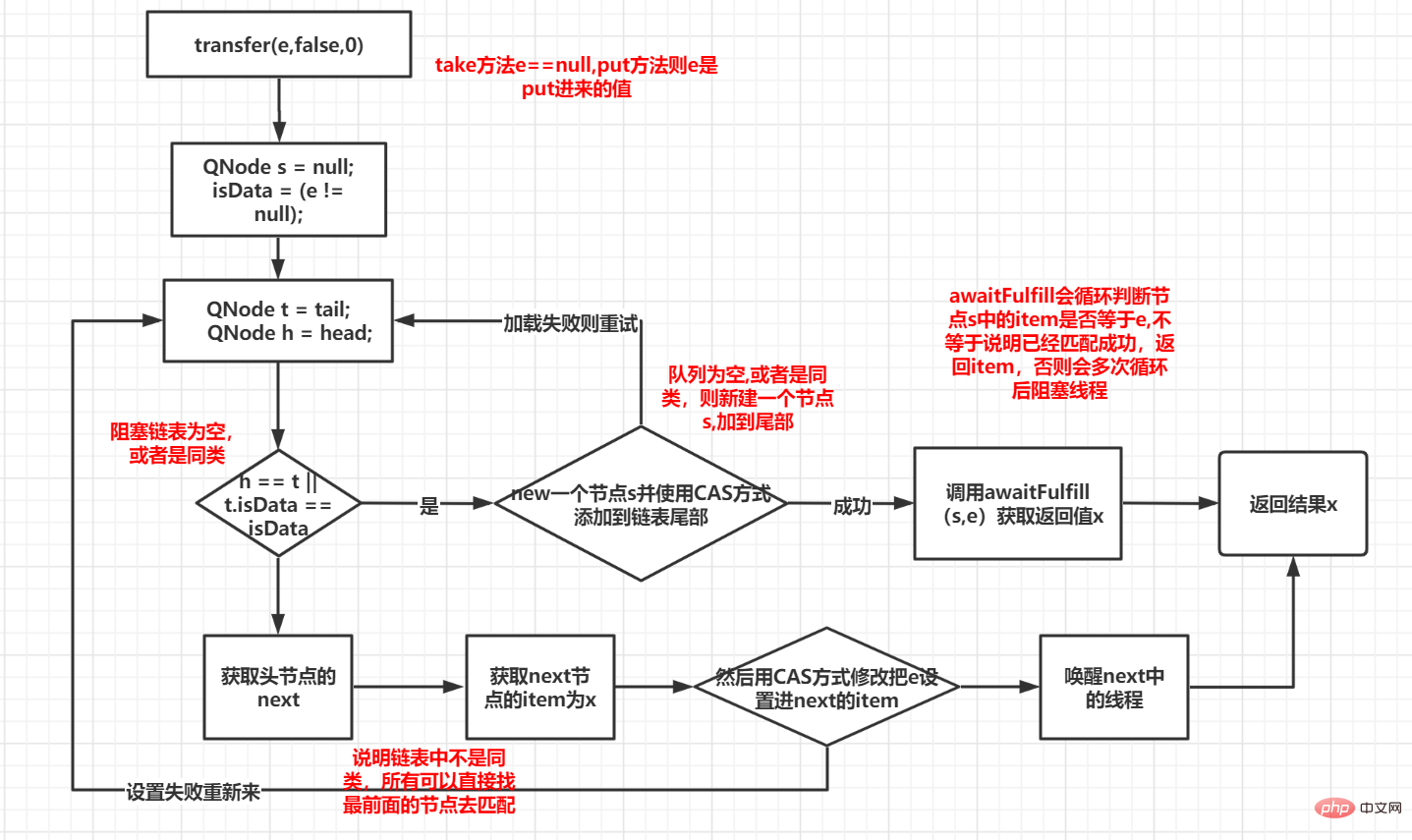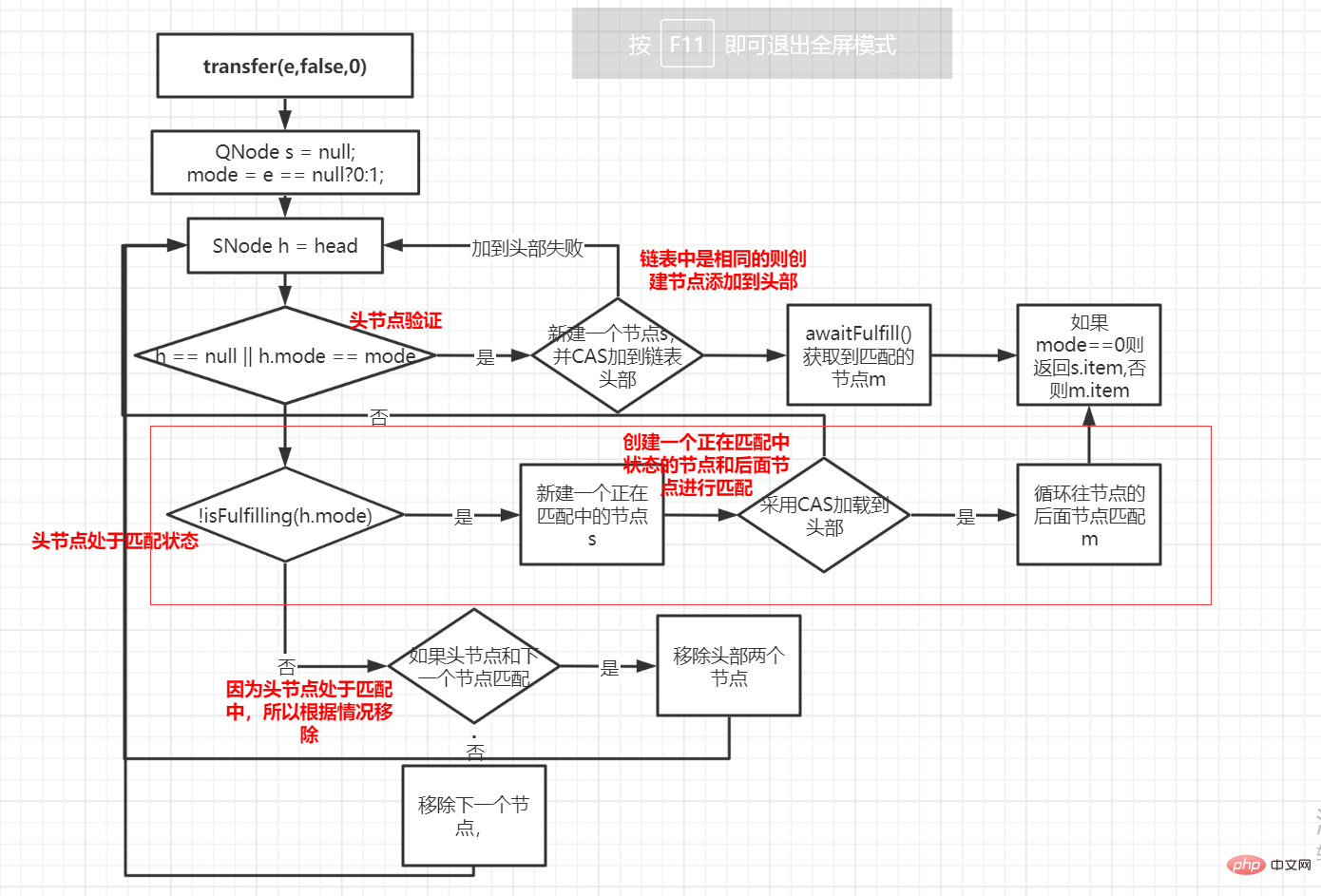What is SynchronousQueue in java
Function Description
To understand SynchronousQueue, you must first know its function. Only by knowing the purpose of this class and the functions it provides can you not get lost when reading the source code.
In our previous study, if threads want to exchange data, they usually use a public variable or a synchronous blocking queue. The producer thread sets the variable or puts the value into the queue, and the consumer thread The thread reads the variable or take from the queue.
SynchronousQueue does not need to store the data exchanged between threads. It functions more like a matcher to match producers and consumers one by one.
General process
For example, when a thread calls the put method and finds that there is no take thread in the queue, the put thread will block. When the take thread comes in, it is found that If there is a blocked put thread, then the two of them will match, and then the take thread will obtain the data of the put thread, and neither thread will be blocked.
On the contrary, a thread calling the take method will also block the thread. When a thread calling the put method comes in, it will also match it.
If a take or put thread comes in and finds that a take or put thread of the same type is blocked, then the thread will be queued to the back until a thread of a different type comes in and matches one of the threads .
Through the process description, I believe that I have a certain understanding of SynchronousQueue, and I also know why SynchronousQueue does not need to store elements.
Source code analysis
By looking at the take and put methods of SynchronousQueue, we found that they are both called the transfer method of an attribute transferer, and the transferer attribute is Abstract static inner class Transferer of SynchronousQueue. Transferer has two subclasses, TransferQueue and TransferStack;
In the SynchronousQueue constructor, the passed parameter fair is used to determine whether to create TransferQueue or TransferStack. According to the parameter fair, TransferQueue should be in fair mode, then TransferStack is a non-functional mode. .
Fair mode TransferQueue implementation
First of all, it has an internal class QNode. Through the above analysis, it is found that there may be multiple consumers or multiple producers, and they will Form a queue, and QNode is a linked list used to form a queue.
QNode mainly has four attributes:
QNode next: represents the next node;
Object item; here is actually the data put out, the node generated by the take method Here is null;
Thread waiter; The blocked thread is usually blocked by the thread that generated this node. Other threads will wake up after getting the data;
boolean isData: true means put generation , false means it is generated by take;
Since both take and put depend on the transfer method, let’s look at the implementation of transfer. The source code is too long so I won’t post it. Just look at the summarized flow chart:

Because this method does not use locks for control, there are still many judgments in the entire process. These are secondary. Here are the main and key processes.
To briefly explain, the entire process relies on the QNode linked list. The isData of QNode distinguishes the take or put method. The isData of the nodes in the linked list must be the same. The items of QNode are take and put threads. The data exchanged, except that the data exchanged by the take method is null.
It can be seen that every time it can be matched, the front node is taken in and the data is returned.
Unfair Mode TransferStack
Similarly, TransferStack also has a linked list structure called SNode. The main attributes of SNode are as follows:
SNode next: the next node;
SNode match: The successfully matched node;
Thread waiter: blocked thread;
Object item: the value to be given;
int mode: Node classification, used to distinguish put or take;
The source code flow chart of transfer is also organized, as shown below:

They are also implemented using linked lists, but this one has a different structure. There is an extra match to represent the matching node.
Through the process, you can see that mode has three values. In addition to 0 and 1, there is also a 2 to represent the node being matched. Mainly in the red box part in the above picture, when finds that the head node is not in progress, the current thread will create a matching node, then add it to the head, and finally match it with the following nodes .
If a match is found, the matching node will be removed from the linked list.
Through process analysis, it can be seen that TransferStack is placed at the head of the thread that comes in later, and will be matched first.
The above is the detailed content of What is SynchronousQueue in java. For more information, please follow other related articles on the PHP Chinese website!

Hot AI Tools

Undresser.AI Undress
AI-powered app for creating realistic nude photos

AI Clothes Remover
Online AI tool for removing clothes from photos.

Undress AI Tool
Undress images for free

Clothoff.io
AI clothes remover

Video Face Swap
Swap faces in any video effortlessly with our completely free AI face swap tool!

Hot Article

Hot Tools

Notepad++7.3.1
Easy-to-use and free code editor

SublimeText3 Chinese version
Chinese version, very easy to use

Zend Studio 13.0.1
Powerful PHP integrated development environment

Dreamweaver CS6
Visual web development tools

SublimeText3 Mac version
God-level code editing software (SublimeText3)

Hot Topics
 Break or return from Java 8 stream forEach?
Feb 07, 2025 pm 12:09 PM
Break or return from Java 8 stream forEach?
Feb 07, 2025 pm 12:09 PM
Java 8 introduces the Stream API, providing a powerful and expressive way to process data collections. However, a common question when using Stream is: How to break or return from a forEach operation? Traditional loops allow for early interruption or return, but Stream's forEach method does not directly support this method. This article will explain the reasons and explore alternative methods for implementing premature termination in Stream processing systems. Further reading: Java Stream API improvements Understand Stream forEach The forEach method is a terminal operation that performs one operation on each element in the Stream. Its design intention is
 PHP: A Key Language for Web Development
Apr 13, 2025 am 12:08 AM
PHP: A Key Language for Web Development
Apr 13, 2025 am 12:08 AM
PHP is a scripting language widely used on the server side, especially suitable for web development. 1.PHP can embed HTML, process HTTP requests and responses, and supports a variety of databases. 2.PHP is used to generate dynamic web content, process form data, access databases, etc., with strong community support and open source resources. 3. PHP is an interpreted language, and the execution process includes lexical analysis, grammatical analysis, compilation and execution. 4.PHP can be combined with MySQL for advanced applications such as user registration systems. 5. When debugging PHP, you can use functions such as error_reporting() and var_dump(). 6. Optimize PHP code to use caching mechanisms, optimize database queries and use built-in functions. 7
 PHP vs. Python: Understanding the Differences
Apr 11, 2025 am 12:15 AM
PHP vs. Python: Understanding the Differences
Apr 11, 2025 am 12:15 AM
PHP and Python each have their own advantages, and the choice should be based on project requirements. 1.PHP is suitable for web development, with simple syntax and high execution efficiency. 2. Python is suitable for data science and machine learning, with concise syntax and rich libraries.
 PHP vs. Other Languages: A Comparison
Apr 13, 2025 am 12:19 AM
PHP vs. Other Languages: A Comparison
Apr 13, 2025 am 12:19 AM
PHP is suitable for web development, especially in rapid development and processing dynamic content, but is not good at data science and enterprise-level applications. Compared with Python, PHP has more advantages in web development, but is not as good as Python in the field of data science; compared with Java, PHP performs worse in enterprise-level applications, but is more flexible in web development; compared with JavaScript, PHP is more concise in back-end development, but is not as good as JavaScript in front-end development.
 Java Program to Find the Volume of Capsule
Feb 07, 2025 am 11:37 AM
Java Program to Find the Volume of Capsule
Feb 07, 2025 am 11:37 AM
Capsules are three-dimensional geometric figures, composed of a cylinder and a hemisphere at both ends. The volume of the capsule can be calculated by adding the volume of the cylinder and the volume of the hemisphere at both ends. This tutorial will discuss how to calculate the volume of a given capsule in Java using different methods. Capsule volume formula The formula for capsule volume is as follows: Capsule volume = Cylindrical volume Volume Two hemisphere volume in, r: The radius of the hemisphere. h: The height of the cylinder (excluding the hemisphere). Example 1 enter Radius = 5 units Height = 10 units Output Volume = 1570.8 cubic units explain Calculate volume using formula: Volume = π × r2 × h (4
 PHP vs. Python: Core Features and Functionality
Apr 13, 2025 am 12:16 AM
PHP vs. Python: Core Features and Functionality
Apr 13, 2025 am 12:16 AM
PHP and Python each have their own advantages and are suitable for different scenarios. 1.PHP is suitable for web development and provides built-in web servers and rich function libraries. 2. Python is suitable for data science and machine learning, with concise syntax and a powerful standard library. When choosing, it should be decided based on project requirements.
 Create the Future: Java Programming for Absolute Beginners
Oct 13, 2024 pm 01:32 PM
Create the Future: Java Programming for Absolute Beginners
Oct 13, 2024 pm 01:32 PM
Java is a popular programming language that can be learned by both beginners and experienced developers. This tutorial starts with basic concepts and progresses through advanced topics. After installing the Java Development Kit, you can practice programming by creating a simple "Hello, World!" program. After you understand the code, use the command prompt to compile and run the program, and "Hello, World!" will be output on the console. Learning Java starts your programming journey, and as your mastery deepens, you can create more complex applications.
 PHP: The Foundation of Many Websites
Apr 13, 2025 am 12:07 AM
PHP: The Foundation of Many Websites
Apr 13, 2025 am 12:07 AM
The reasons why PHP is the preferred technology stack for many websites include its ease of use, strong community support, and widespread use. 1) Easy to learn and use, suitable for beginners. 2) Have a huge developer community and rich resources. 3) Widely used in WordPress, Drupal and other platforms. 4) Integrate tightly with web servers to simplify development deployment.






